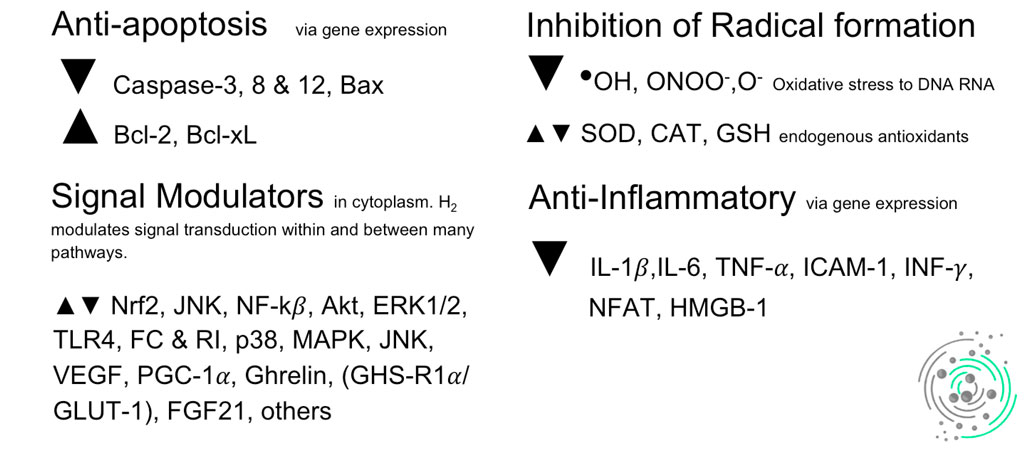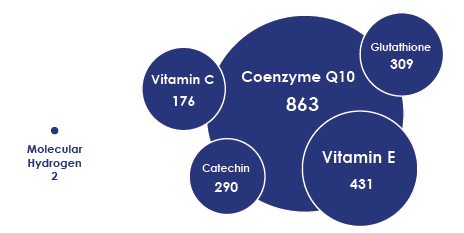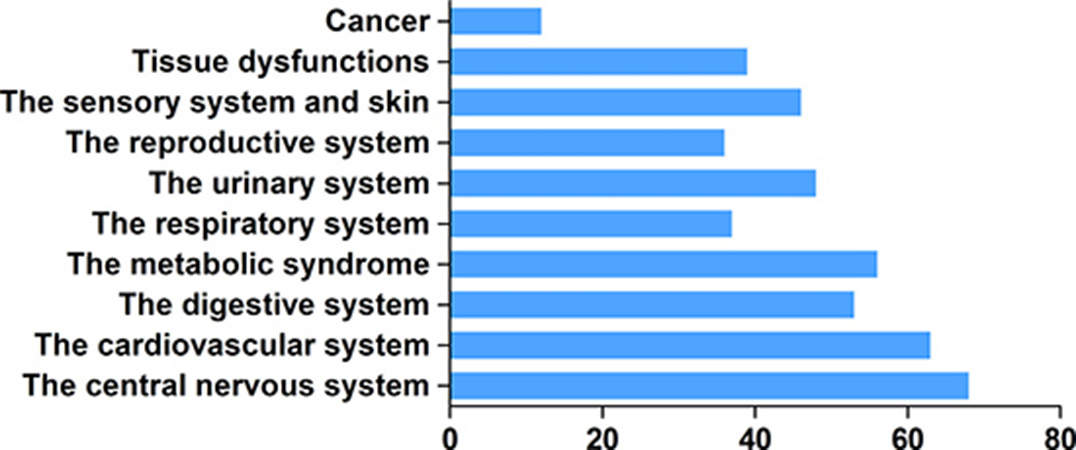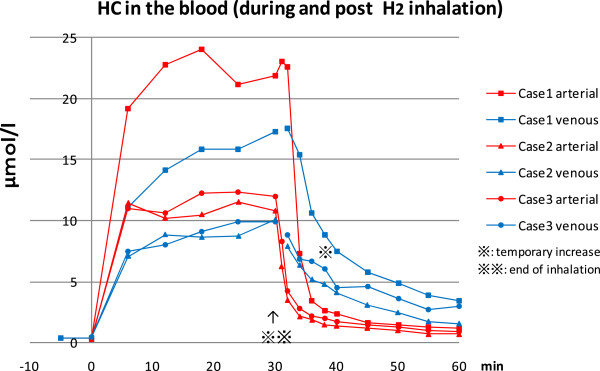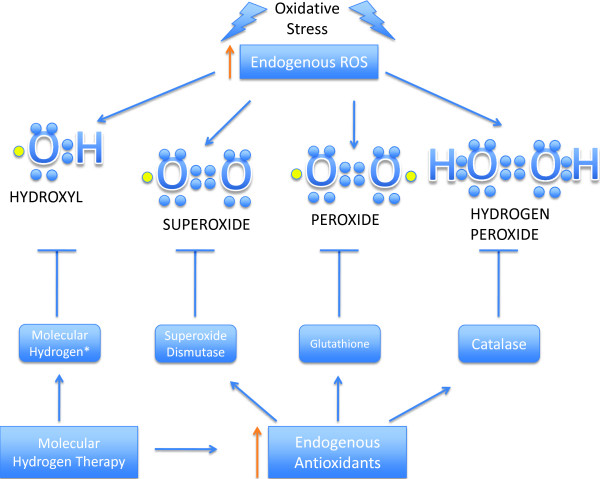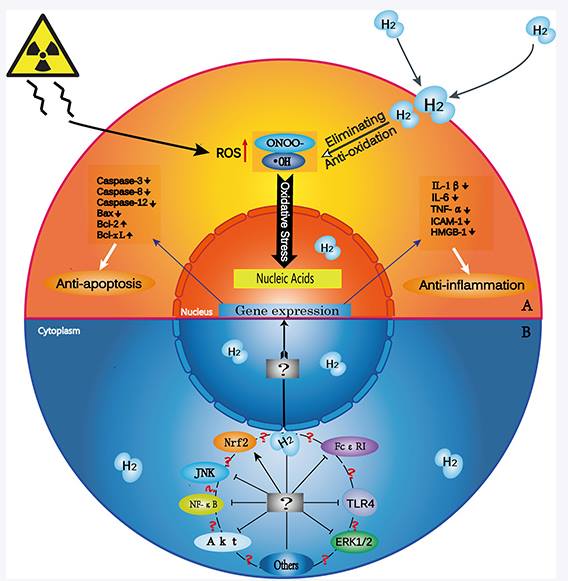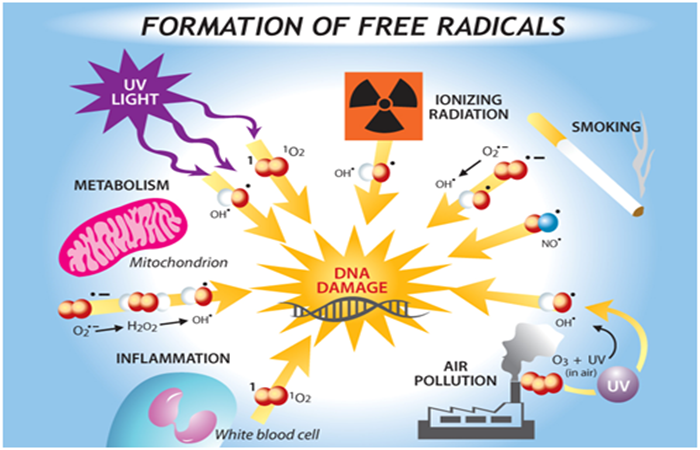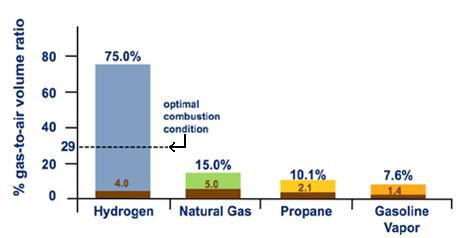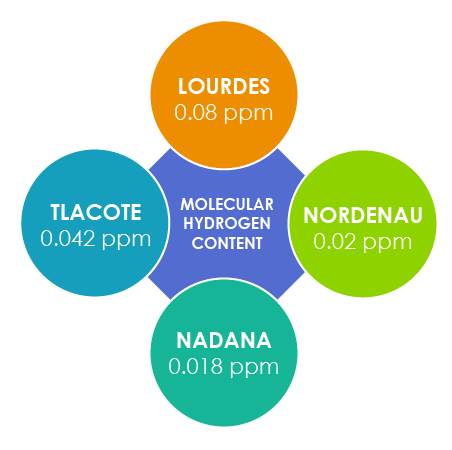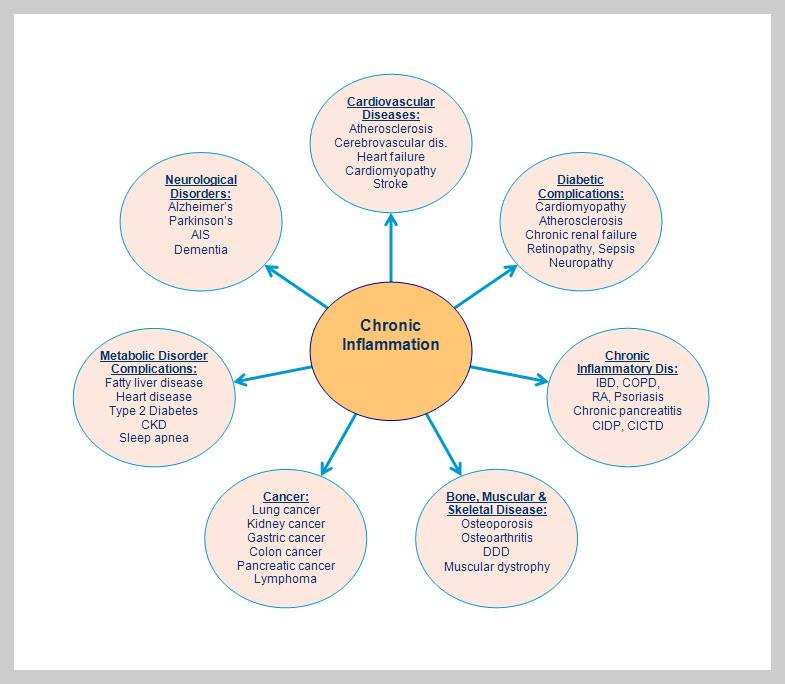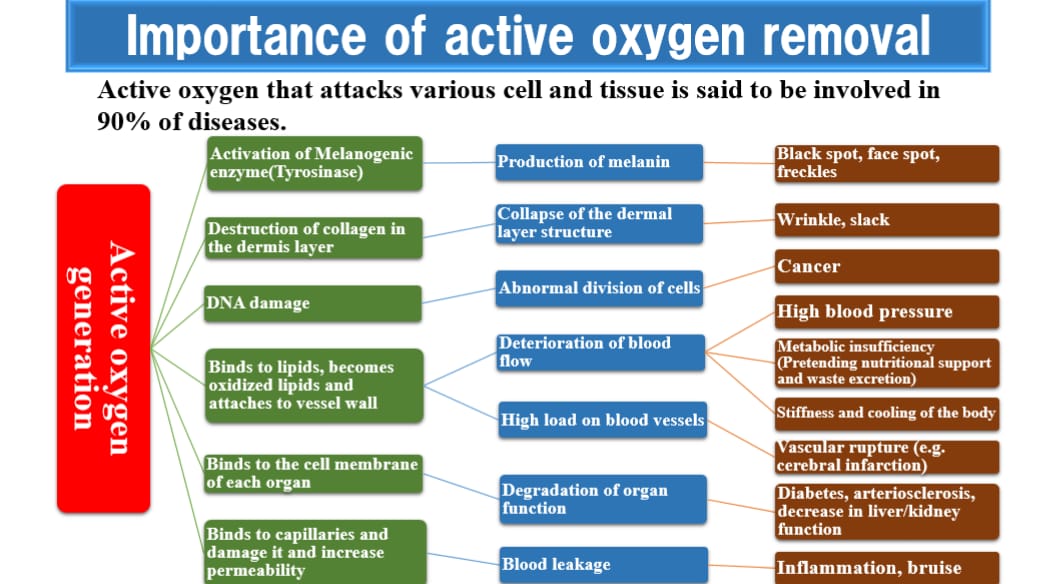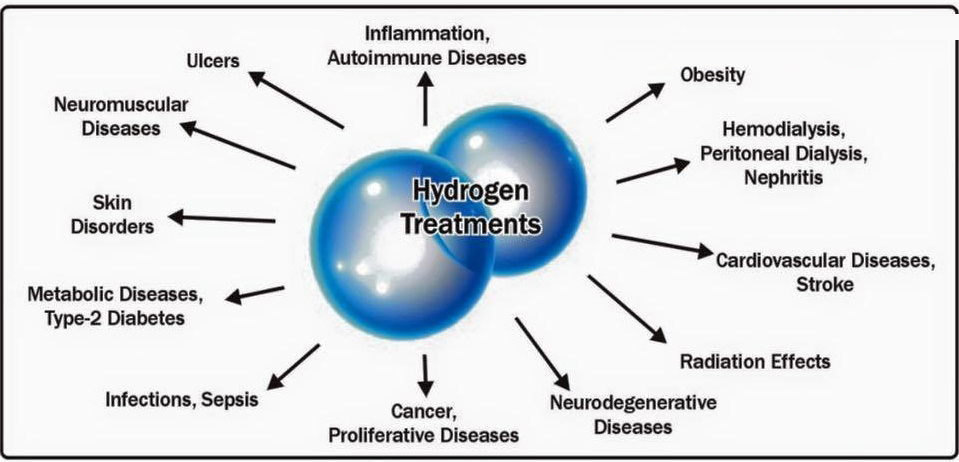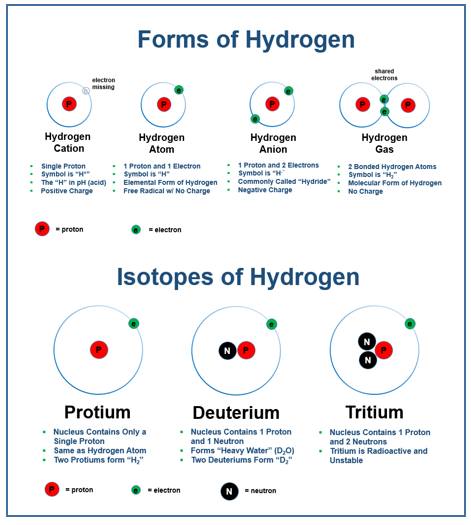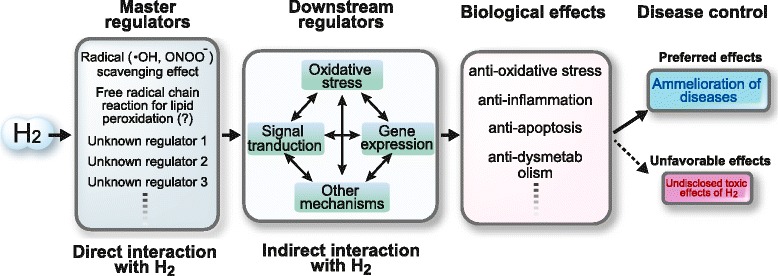 Molecular hydrogen studies
trials and serious research
Molecular hydrogen studies
trials and serious research
Contents
Introduction
Molecular hydrogen is being studied intensely in Asia by Scientists, MDs and PhDs. There are over 600 studies published. Hydrogen helps with over 166 human identified conditions. It has been shown to be safe for everyone, as the body makes it naturally every day in the intestines. The clinical studies are mostly reported from Japan, Korea and China, the three countries that are actively funding molecular hydrogen research.
Hydrogen gas has no cytotoxicity, even at high concentrations. The safety of H2 for humans is demonstrated by its application in Hydreliox, an exotic breathing gas with a mixture of 49% H2, 50% helium and 1% O2, which is used to prevent decompression sickness and nitrogen narcosis during very deep technical diving. ( 1 ) With Hydreliox in their tanks, scuba divers can safely pursue diving depths of up to four hundred feet.
Hydrogen water has lots of not understood properties. The absolute tiniest concentration dissolved in water has still statistical significant effects. Notably, H2 concentrations as low as 0.08 ppm exhibited nearly the same effects as saturated Hydrogen water with (1.5 ppm). Therefore, the amount of administered H2 seems to be independent of the magnitude of effects in many cases.
We need to know how to optimize H2 dose, timing, and delivery methods. Nevertheless, for H2 treatment, promising applications are emerging for many human diseases, and personalized treatments for patients are a therapeutic goal. Thus, appropriately designed for large-scale, prospective clinical studies are warranted.
The positive effects of H2 have been observed in practically all organs covering 31 disease categories that can be subdivided into 166 disease models, human diseases, treatment-associated pathologies, and pathophysiological conditions of plants. A predominance of oxidative stress-mediated diseases and inflammatory diseases has been observed.
A successful drug has to be easily available, diffuse rapidly, act on multiple pathological intertwined mechanisms and have few side effects. Hydrogen is all that.
- Human Studies that are in the process of clinical trials and that have shown beneficial reactions are done on Cancer, Exercise, Inflammation, Kidney, Metabolism, Muscle, Nervous System, Skin, type 2 Diabetes, Cerebral Ischemia, Rheumatoid Arthritis and Parkinson’s Disease. ( 12 )
- Animal Studies that have shown beneficial reactions are done on Cancer, Cardio vascular, Eye and Ear, Gut, Inflammation. Kidney, Liver, Lung and Metabolism. ( 13 )
- In Vitro Studies that have shown beneficial reactions are done on Wound healing, Mitochondrial inflammations, Radical scavenging, Improved Blood fluidity, Lymphocyte protection against ionizing radiation, inflammation inhibition in retinal microglia cells, attenuates fatty acid uptake and lipid accumulation and inhibits the growth of human tongue carcinoma cells. ( 14 )
Hydrogen Science "crash courses"
These publications are very instructive because they summarize all current and past studies on Hydrogen.
2016: Dr. Gart L. Nicholson reports on 338 publications studying the benefits of molecular hydrogen at scirp.org:
2017: Li Ge, Li Ming Yang, Na-Na Yang, Xin-Xin Yin and Wen-Gang Song report in another very detailed summary at oncotarget.com:
Click any of the links above and search in the opening document for the medical term you are interested in.
Tip: You will find bracketed numbers like this [3] all over in these documents. Clicking them will show the url of the original publication at the bottom of the document.
Human studies with hydrogen
The most common argument of critics is that the scientific studies are done only in vitro and with animals. Nothing could be further from the truth. There are each year more studies and trials done with humans. A revolution in remedial and preventive medicine is coming.
60 completed and published human studies [ 15 ]
Another 25 registered, but still running human studies [ 16 ]
This hydrogen inhalation therapy is the first full-scale clinical trial in the world to confirm the effectiveness performed by the Japanese Ministry of Health, Labor and Welfare after being certified as advanced medical technology. A multi institution, double blind, human clinical trial: Efficacy of inhaled hydrogen gas therapy for patients after out-of-hospital cardiac arrest [17] [Google translation]
Tip: Sometimes, when the content is just the abstract, you have to look for the full article at the bottom of the opening page.
Diagrams and Images click images to enlarge
Listings by organ or disease name
The scope of all research done since 2007 covers nearly every disease known.
Reviewing the three lists below and considering the non-toxicity and benign nature of Hydrogen, it is possible to experiment in any direction. The trend in all reports is towards homeostasis.
General
A collection of general articles, studies and publications.
Aging
Alzheimer
Anti-Oxidant
Arthritis
Autism
Biofilms
Brain
Bipolar - Schizophrenia
Cancer
Depression
Detoxification
Diabetes
Dialysis
Excessive production of free radicals
Exercise
- Pilot study: Effects of drinking hydrogen-rich water on muscle fatigue caused by acute exercise in elite athletes
- Effectiveness of oral and topical hydrogen for sports-related soft tissue injuries
- Effects of hydrogen rich water on prolonged intermittent exercise
- Hydrogen-rich saline attenuates isoflurane-induced caspase-3 activation and cognitive impairment via inhibition of isoflurane-induced oxidative stress, mitochondrial dysfunction, and reduction in ATP levels
- Is molecular hydrogen beneficial to enhancepost-exercise recovery in female athletes?
- Molecular hydrogen in sports medicine: new therapeutic perspectives
Eyes
- The potential utilizations of hydrogen as a promising therapeutic strategy against ocular diseases
- Molecular Hydrogen Effectively Heals Alkali-Injured Cornea via Suppression of Oxidative Stress
- Hydrogen prevents corneal endothelial damage in phacoemulsification cataract surgery
- Use of Hydrogen as a Novel Therapeutic Strategy Against Photoreceptor Degeneration in Retinitis Pigmentosa Patients
Gastric injury, ulcers, alcohol damage
Heart Attack
Lungs
- Hydrogen Therapy may be a Novel and Effective Treatment for COPD
- Protection of oral hydrogen water as an antioxidant on pulmonary hypertension
- Protective effect of hydrogen on the lung of sanitation workers exposed to haze
- Innovatively therapeutic strategy on Lung Cancer by daily drinking antioxidative Plasmon-induced activated water
Plants
- Hydrogen evolution and absorption phenomena in plasma membrane of higher plants
- Molecular Hydrogen Is Involved in Phytohormone Signaling and Stress Responses in Plants
- Progress in the study of biological effects of hydrogen on higher plants and its promising application in agriculture
- Oxygen and Air Nanobubble Water Solution Promote the Growth of Plants, Fishes, and Mice
Radio-protective
Sepsis
Animal
A collection of animal studies and publications.
Allergies
- Molecular hydrogen suppresses FcepsilonRI-mediated signal transduction and prevents degranulation of mast cells.
- Hydrogen-rich saline attenuates eosinophil activation in a guinea pig model of allergic rhinitis via reducing oxidative stress
- Effect of hydrogen-rich saline on the CD4(+) CD25(+) Foxp3(+) Treg cells of allergic rhinitis guinea pigs model
- Inhalation of hydrogen gas attenuates airway inflammation and oxidative stress in allergic asthmatic mice
Aging
Cancer
Chemotherapy
Exercise
Gastric injury, ulcers, alcohol damage
Inflammatory Bowel Disease
Kidneys
Lungs
Muscle Dystrophy
Neuropathic Pain
Nose
Oral
- Hydrogen-Rich Water Intake Accelerates Oral Palatal Wound Healing via Activation of the Nrf2/Antioxidant Defense Pathways in a Rat Model
- Preventive Effects of Drinking Hydrogen-Rich Water on Gingival Oxidative Stress and Alveolar Bone Resorption in Rats Fed a High-Fat Diet
- Effect of hydrogen-rich water on acute peritonitis of rat models
Parkinson
Radio-protective
Sepsis
Skin
- Histological study on the effect of electrolyzed reduced water-bathing on UVB radiation-induced skin injury in hairless mice
- Hydrogen water ameliorates the severity of atopic dermatitis-like lesions and decreases interleukin-1β, interleukin-33, and mast cell infiltration in NC/Nga mice
- The Drinking Effect of Hydrogen Water on Atopic Dermatitis Induced by Dermatophagoides farinae Allergen in NC/Nga Mice
- Improvement of psoriasis-associated arthritis by treatment with molecular hydrogen
- Protective effect of inhalation of hydrogen gas on radiation-induced dermatitis and skin injury in rats
Stress
Stroke
Wound Healing
Human
A collection of the human studies and publications. There are 25 more to be completed in the next years.
Aging
Antibodies
Arthritis
- Therapeutic efficacy of infused molecular hydrogen in saline on rheumatoid arthritis: A randomized, double-blind, placebo-controlled pilot study.
- Consumption of water containing a high concentration of molecular hydrogen reduces oxidative stress and disease activity in patients with rheumatoid arthritis: an open-label pilot study
Blood
Confirmation of hydrogen in breath
Chemotherapy
Cognitive impairment
Corona Virus
- 2020 Feb: Copy link and use Chrome browser to translate the Chinese original.
Full document in Chinese containing information on nhc.gov.cn - 2020 Feb: Copy link and use Chrome browser to translate the Chinese original.
A Multicenter, Randomized, Parallel Controlled Clinical Study of Hydrogen-Oxygen Nebulizer to Improve the Symptoms of Patients With Novel Coronavirus Pneumonia (COVID-19) - 2020 Feb: From the WHO covid-19 registered trials and analysis.
Hydrogen Attenuates Allergic Inflammation by Reversing Energy Metabolic Pathway Switch. - 2020 Feb: Potential Cheap and effective Drug for COVID-19.
- 2011 Apr: Hydrogen Therapy may be a Novel and Effective Treatment for COPD on nih.gov in the USA.
- 2010 Dec: Hydrogen inhalation ameliorates ventilator-induced lung injury.
- 2020 Feb: Copy link and use Chrome browser to translate the Chinese original.
Cystitis
Depression
Diabetes
- Hydrogen gas production is associated with reduced interleukin-1beta mRNA in peripheral blood after a single dose of acarbose in Japanese type 2 diabetic patients.
- Supplementation of hydrogen-rich water improves lipid and glucose metabolism in patients with type 2 diabetes or impaired glucose tolerance
Dialysis
- Novel haemodialysis (HD) treatment employing molecular hydrogen (H2)-enriched dialysis solution improves prognosis of chronic dialysis patients: A prospective observational study
- Improvement of the fraction of human mercaptalbumin on hemodialysis treatment using hydrogen-dissolved hemodialysis fluid: a prospective observational study
- Transperitoneal administration of dissolved hydrogen for peritoneal dialysis patients: a novel approach to suppress oxidative stress in the peritoneal cavity
- A novel bioactive haemodialysis system using dissolved dihydrogen (H-2) produced by water electrolysis: a clinical trial
- Electrolysed-reduced water dialysate improves T-cell damage in end-stage renal disease patients with chronic haemodialysis
- Biological Effects of Electrolyzed Water in Hemodialysis.
- Electrolyzed-reduced water reduced hemodialysis-induced erythrocyte impairment in end-stage renal disease patients
Excercise
- Acute Supplementation with Molecular Hydrogen Benefits Submaximal Exercise Indices. Randomized, Double-Blinded, Placebo-Controlled Crossover Pilot Study
- 28-days Hydrogen-rich Water Supplementation Affects Exercise Capacity in Mid-age Overweight Women
- Drinking hydrogen-rich water for 4 weeks positively affects serum antioxidant enzymes in healthy men: a pilot study
- Selective protective effect of hydrogen water on free radical injury of athletes after high-intensity exercise
- Hydrogen-rich Water Modulates Redox Status Repeated Three Consecutive Days Of Strenuous Exercise (3298 Board# 203 June 2)
- Effects of hydrogen rich water on prolonged intermittent exercise. J Sports Med Phys Fitness
- Effects of hydrogen bathing on exercise-induced oxidative stress and delayed-onset muscle soreness
- Molecular Hydrogen Affected Post-Exercise Recovery in Judo Athletes: 3820 Board# 259 June 4, 9: 30 AM-11: 00 AM
- Effectiveness of oral and topical hydrogen for sports-related soft tissue injuries
- Pilot study: Effects of drinking hydrogen-rich water on muscle fatigue caused by acute exercise in elite athletes.
Heart attack
Hepatisis
Hemorrhage
Metabolism
- Molecular hydrogen affects body composition, metabolic profiles, and mitochondrial function in middle-aged overweight women
- Hydrogen-rich water decreases serum LDL-cholesterol levels and improves HDL function in patients with potential metabolic syndrome
- Effectiveness of Hydrogen Rich Water on Antioxidant Status of Subjects with Potential Metabolic Syndrome-An Open Label Pilot Study
Myopathy
Organ Transplantation
Parkinson
Periodontitis
Radiation
Stroke
- Multi institutions double blind human trial: Efficacy of inhaled hydrogen gas therapy for patients after out-of-hospital cardiac arrest
- Promising novel therapy with hydrogen gas for emergency and critical care medicine
- Hydrogen Gas Inhalation Treatment in Acute Cerebral Infarction: A Randomized Controlled Clinical Study on Safety and Neuroprotection
- Safety of intravenous administration of hydrogen-enriched fluid in patients with acute cerebral ischemia: initial clinical studies
- A basic study on molecular hydrogen (H2) inhalation in acute cerebral ischemia patients for safety check with physiological parameters and measurement of blood H2 level
Skin
- Hydrogen (H2) treatment for acute erythymatous skin disease. A report of 4 patients with safety data and a non-controlled feasibility study with H2 concentration measurement on two volunteers
- Positive effects of hydrogen-water bathing in patients of psoriasis and parapsoriasis en plaques
- Improvement of psoriasis-associated arthritis and skin lesions by treatment with molecular hydrogen: A report of three cases
- Hydrogen water intake via tube-feeding for patients with pressure ulcer and its reconstructive effects on normal human skin cells in vitro
- Hydrogen (H2) treatment for acute erythymatous skin diseases. A report of 4 patients with safety data and a non-controlled feasibility study with H2 concentration measurement on two volunteers.
Vascular system
List of Publications
Search and review the nih.gov: HTML
Search and review biomedcentral.com: HTML
General Studies about Hydrogen.
- 2020 Pharmacokinetics of a single inhalation of hydrogen gas in pigs.
- Hydrogen gas distribution in organs after inhalation: Real-time monitoring of tissue hydrogen concentration in rat
- Hydrogen is safe: Biological safety of neutral-pH hydrogen-enriched electrolyzed water upon mutagenicity, genotoxicity and subchronic oral toxicity.
- Hydrogen, the next neuroprotective agent? 2019
- Methods of Ingestion
- Convenient methods for ingestion of molecular hydrogen: drinking, injection, and inhalation
- Concentration and solubility of hydrogen
- MHF - studies - cancer
- Multiple Effects of Molecular Hydrogen and its Distinct Mechanism
- Hydroxyl Radical and it's Scavengers in Health and Disease, a very good explanation of oxidative stress
- Recent Progress Toward Hydrogen Medicine: Potential of molecular hydrogen for Preventive and Therapeutic Applications
- Diseases and physiological states for which hydrogen effects are reported
- Another list ( Hindawi )
- A very complete list ( e-miz.co.jp )
- Estimation of the hydrogen concentration in rat tissue using an airtight tube following the administration of hydrogen via various routes
- ToxNet - All things Hydrogen
- Preventing explosions of hydrogen gas inhalers
- Ascleway.org A Chinese research company
- Molecular Hydrogen as an Emerging Therapeutic Medical Gas for Neurodegenerative and Other Diseases
Web links
The reference links to hydrogen information
FDA GRAS Notice (Generally Recognized as Safe)
Lots of information and links at the Molecular Hydrogen Foundation
Listing of current Molecular Hydrogen studies
Hydrogen helps with this - Top 100 List
Youtube
Tyler W. Lebaron: H2 Discussion with Dr. Ohta, July 2017 - 1 hour
I guess everyone gets the idea that for a lot of patients, hydrogen could better their lives.
